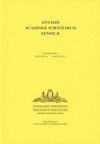包含共轭代数整数的小圆盘
IF 0.9
4区 数学
Q2 Mathematics
Annales Academiae Scientiarum Fennicae-Mathematica
Pub Date : 2020-01-01
DOI:10.5186/aasfm.2020.4524
引用次数: 0
摘要
已知半径为R的圆盘(封闭或开放)的超有限直径为R,而长度为I的区间的超有限直径为I/4。在[7]中,Fekete证明了满足τ(E) < 1的每一个紧集E在q上只包含有限多个共轭代数整数的完整集合,特别地,这个结果可以应用于半径小于1的每一个闭盘和长度小于4的每一个实区间。在相反的方向上,Fekete和Szegö[8]证明了如果E是一个在复共轭下稳定且满足τ(E)≥1的紧集,则它的每一个复邻域F(使得E∧F和F是开集)包含无穷多个共轭代数整数集。进一步,由Robinson[15]和enola[4]的结果,每个长度严格大于4的实区间也包含无穷多个共轭代数整数集。在[18]中,Zaïmi给出了包含d次代数整数及其共轭的实区间长度的下界。他的结果证明了这个区间的长度I至少为4−φ(d),其中φ(d)是一个显式的正函数,当d→∞时趋于零。(例如,可以取φ(d) = (c log d)/d,取c > 0。类似的界也可以从早先的Schur[17]的结果中得到。另一方面,作者证明了对于无穷多个d∈N,每个长度为4+4(log log d)/ log d的实区间都包含一个d次的代数整数及其共轭(见[2]和[3])。不知道是否存在区间[t, t+ 4],其中某t∈R\Z包含无穷多个代数整数的完整集合。对于t∈Z,可以简单地取无穷多个形式为t+2 cos(πr)+2的代数整数,其中r∈q,根据Kronecker定理[13],当t∈Z时,[t, t+4]中只有这些数。本文章由计算机程序翻译,如有差异,请以英文原文为准。
Small discs containing conjugate algebraic integers
is called the transfinite diameter (or logarithmic capacity) of E. It is known that a (closed or open) disc with radius R has transfinite diameter R, whereas an interval of lenght I has transfinite diameter I/4. In [7], Fekete has shown that every compact set E satisfying τ(E) < 1 contains only finitely many full sets of conjugate algebraic integers over Q. In particular, this result can be applied to every closed disc whose radius is smaller than 1 and to every real interval whose length is smaller than 4. In the opposite direction, Fekete and Szegö [8] proved that if E is a compact set which is stable under complex conjugation and satisfies τ(E) ≥ 1, then its every complex neighborhood F (so that E ⊂ F and F is an open set) contains infinitely many sets of conjugate algebraic integers. Furthermore, by the results of Robinson [15] and Ennola [4], every real interval of length strictly greater than 4 also contains infinitely many sets of conjugate algebraic integers. In [18], Zaïmi gave a lower bound for the length of a real interval containing an algebraic integer of degree d and its conjugates. His result asserts that the length I of such an interval should be at least 4 − φ(d), where φ(d) is some explicit positive function which tends to zero as d → ∞. (For instance, one can take φ(d) = (c log d)/d with some c > 0. Similar bound also follows from an earlier result of Schur [17].) On the other hand, the author has shown that, for infinitely many d ∈ N, every real interval of length 4+4(log log d)/ log d contains an algebraic integer of degree d and its conjugates (see [2] and [3]). It is not known whether there is an interval [t, t+ 4] with some t ∈ R\Z containing infinitely many full sets of algebraic integers. For t ∈ Z, one can simply take infinitely many algebraic integers of the form t+2 cos(πr)+2, where r ∈ Q. By Kronecker’s theorem [13], these are the only such numbers in [t, t+4] if t ∈ Z.
求助全文
通过发布文献求助,成功后即可免费获取论文全文。
去求助
来源期刊
CiteScore
1.30
自引率
0.00%
发文量
0
审稿时长
>12 weeks
期刊介绍:
Annales Academiæ Scientiarum Fennicæ Mathematica is published by Academia Scientiarum Fennica since 1941. It was founded and edited, until 1974, by P.J. Myrberg. Its editor is Olli Martio.
AASF publishes refereed papers in all fields of mathematics with emphasis on analysis.

 求助内容:
求助内容: 应助结果提醒方式:
应助结果提醒方式:


